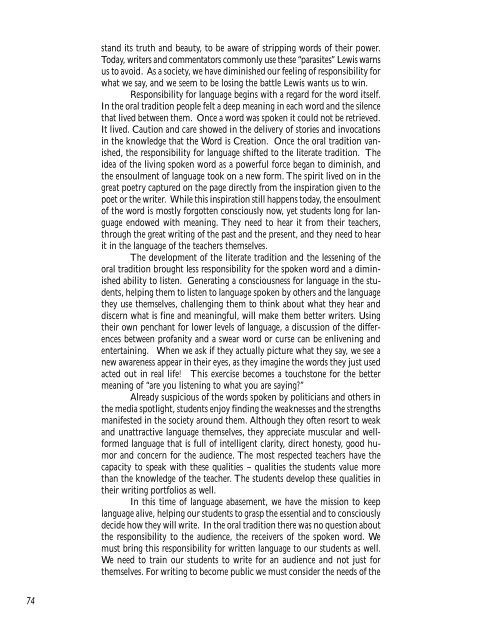Colloquium on English - Research Institute for Waldorf Education
Colloquium on English - Research Institute for Waldorf Education
Colloquium on English - Research Institute for Waldorf Education
You also want an ePaper? Increase the reach of your titles
YUMPU automatically turns print PDFs into web optimized ePapers that Google loves.
74<br />
stand its truth and beauty, to be aware of stripping words of their power.<br />
Today, writers and commentators comm<strong>on</strong>ly use these “parasites” Lewis warns<br />
us to avoid. As a society, we have diminished our feeling of resp<strong>on</strong>sibility <strong>for</strong><br />
what we say, and we seem to be losing the battle Lewis wants us to win.<br />
Resp<strong>on</strong>sibility <strong>for</strong> language begins with a regard <strong>for</strong> the word itself.<br />
In the oral traditi<strong>on</strong> people felt a deep meaning in each word and the silence<br />
that lived between them. Once a word was spoken it could not be retrieved.<br />
It lived. Cauti<strong>on</strong> and care showed in the delivery of stories and invocati<strong>on</strong>s<br />
in the knowledge that the Word is Creati<strong>on</strong>. Once the oral traditi<strong>on</strong> vanished,<br />
the resp<strong>on</strong>sibility <strong>for</strong> language shifted to the literate traditi<strong>on</strong>. The<br />
idea of the living spoken word as a powerful <strong>for</strong>ce began to diminish, and<br />
the ensoulment of language took <strong>on</strong> a new <strong>for</strong>m. The spirit lived <strong>on</strong> in the<br />
great poetry captured <strong>on</strong> the page directly from the inspirati<strong>on</strong> given to the<br />
poet or the writer. While this inspirati<strong>on</strong> still happens today, the ensoulment<br />
of the word is mostly <strong>for</strong>gotten c<strong>on</strong>sciously now, yet students l<strong>on</strong>g <strong>for</strong> language<br />
endowed with meaning. They need to hear it from their teachers,<br />
through the great writing of the past and the present, and they need to hear<br />
it in the language of the teachers themselves.<br />
The development of the literate traditi<strong>on</strong> and the lessening of the<br />
oral traditi<strong>on</strong> brought less resp<strong>on</strong>sibility <strong>for</strong> the spoken word and a diminished<br />
ability to listen. Generating a c<strong>on</strong>sciousness <strong>for</strong> language in the students,<br />
helping them to listen to language spoken by others and the language<br />
they use themselves, challenging them to think about what they hear and<br />
discern what is fine and meaningful, will make them better writers. Using<br />
their own penchant <strong>for</strong> lower levels of language, a discussi<strong>on</strong> of the differences<br />
between profanity and a swear word or curse can be enlivening and<br />
entertaining. When we ask if they actually picture what they say, we see a<br />
new awareness appear in their eyes, as they imagine the words they just used<br />
acted out in real life! This exercise becomes a touchst<strong>on</strong>e <strong>for</strong> the better<br />
meaning of “are you listening to what you are saying?”<br />
Already suspicious of the words spoken by politicians and others in<br />
the media spotlight, students enjoy finding the weaknesses and the strengths<br />
manifested in the society around them. Although they often resort to weak<br />
and unattractive language themselves, they appreciate muscular and well<strong>for</strong>med<br />
language that is full of intelligent clarity, direct h<strong>on</strong>esty, good humor<br />
and c<strong>on</strong>cern <strong>for</strong> the audience. The most respected teachers have the<br />
capacity to speak with these qualities – qualities the students value more<br />
than the knowledge of the teacher. The students develop these qualities in<br />
their writing portfolios as well.<br />
In this time of language abasement, we have the missi<strong>on</strong> to keep<br />
language alive, helping our students to grasp the essential and to c<strong>on</strong>sciously<br />
decide how they will write. In the oral traditi<strong>on</strong> there was no questi<strong>on</strong> about<br />
the resp<strong>on</strong>sibility to the audience, the receivers of the spoken word. We<br />
must bring this resp<strong>on</strong>sibility <strong>for</strong> written language to our students as well.<br />
We need to train our students to write <strong>for</strong> an audience and not just <strong>for</strong><br />
themselves. For writing to become public we must c<strong>on</strong>sider the needs of the

















